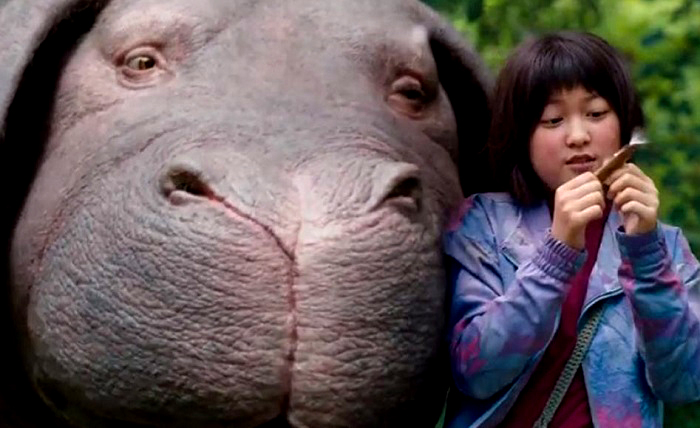

Okja isn't a great film, but it is a great film to support. A strange and tonally all-over-the-map tale about a girl and her genetically engineered super pig, the movie may be the biggest release yet from Netflix, which you watch on your TV (or tablet or phone) yet is interested in making films with a capital "F" that no major motion-picture studio would touch. It's co-written and directed by Bong Joon-ho, whose last release was the bizarre — and very, very good — post-apocalypse-on-a-train actioner, Snowpiercer.
Okja is even weirder, as Snowpiercer at least stuck to one genre and riffed on some obvious touchstones like the Mad Max saga and the work of John Carpenter. Joon-ho's new one begins with a press conference, as Lucy Mirando (Tilda Swinton), the CEO of an American food corporation, announces the discovery of a super pig, a revolutionary new animal that could feed millions without further damaging the environment. In celebration, the company is going to send 26 of them to farmers around the world to be raised using native customs, with one returned to New York and declared the most impressive super pig in 10 years time. It's an interesting opening, featuring another nutty turn by Swinton and ending on a cruel yet funny joke.
From there, the movie jumps a decade into the future and halfway around the world. Okja, one of the specially selected super pigs, has grown to immense size and lives with an elderly South Korean farmer and his 14-year-old granddaughter, Mija (Ahn Seo-hyun). Having raised Okja since she was a piglet, Mija has formed an unbreakable bond with her animal, and the two spend their days frolicking together around a gorgeous mountainous countryside. These scenes feel like a live-action adaption of a lost Hayao Miyazaki movie, and they are delightful — likely my favorite in the film. Okja is a gorgeous CGI character: part pig, part hippo, part Falcor. Her digital underpinnings are only hinted at when a human actor touches her skin in close-up.
Soon, though, Mirando's cooperate goons show up, including the "public face" of the company, a washed-up, buffoonish TV zoologist played by an unrecognizable Jake Gyllenhaal (wearing too-short shorts, sporting a handlebar mustache and speaking in high-pitched squeal). Okja is declared the ultimate super pig and is taken away from Mija first to Seoul and then to New York. The rest of the film details Mija's efforts to rescue her animal friend, who is destined to wind up under cellophane in grocery stores if left to corporate devices.
From there the movie is a whirlwind of big serious topics (GMOs, the hard realities of food production, the evils of corporate America, selfie culture) haphazardly mixed with a never-ending series of over-the-top characters. Every actor Seo-hyun comes into contact with goes full Tilda in this movie, including Tilda, who goes full Tilda TWICE. (Seriously, what's the deal with Swinton playing twins? Is this a regular thing now?) Whereas Snowpiercer featured a couple of out-of-left-field characters, including Swinton's hilariously villainous one-percenter and Alison Pill's chirpy school teacher, to stand-out against more classic archetypes, Okja is flowing over with gimmicky, broadly-played performances. Yeah, it's neat to see Gyllenhaal play against type. But we've also got Paul Dano as the overly sensitive leader of the Animal Liberation Front, along with his oddball underlings, including one who's fasting to ease his personal ecological footprint and is only around for that joke specifically.
It's a tricky balancing act for Joon-ho, who also manages to include a lengthy (and admittedly impressive) rescue sequence and multiple poop jokes. ("He's having a shitty day!" one character says when another gets shat on by Okja. "It's beautiful … and eco-friendly!") Ultimately, it proves to be too much, and while the movie never quite collapses under its own ambitions, I do think the emotional resonance it's striving for ends up muted as a result. There are also a few strange narrative omissions. Early on, it's made clear that Okja is smarter than any real-life animal. It uses reasoning and deduction to save Mija's life, yet this animal's incredibly intelligence is never used as an argument against turning it into food. (And are all the other super pigs as smart as Okja? The movie never tell us.)
Despite the fact that Okja failed to entirely connect with me, its noble eccentricity makes me want to see more films like it — more from Joon-ho and more from Netflix. Who cares whether they play in a theater or not? This was a movie worth making, and I'm sure there are hundreds more out there the big risk-adverse studios won't touch. God bless Netflix for supporting filmmakers concerned with things other than shared universes and repackaged franchises.











